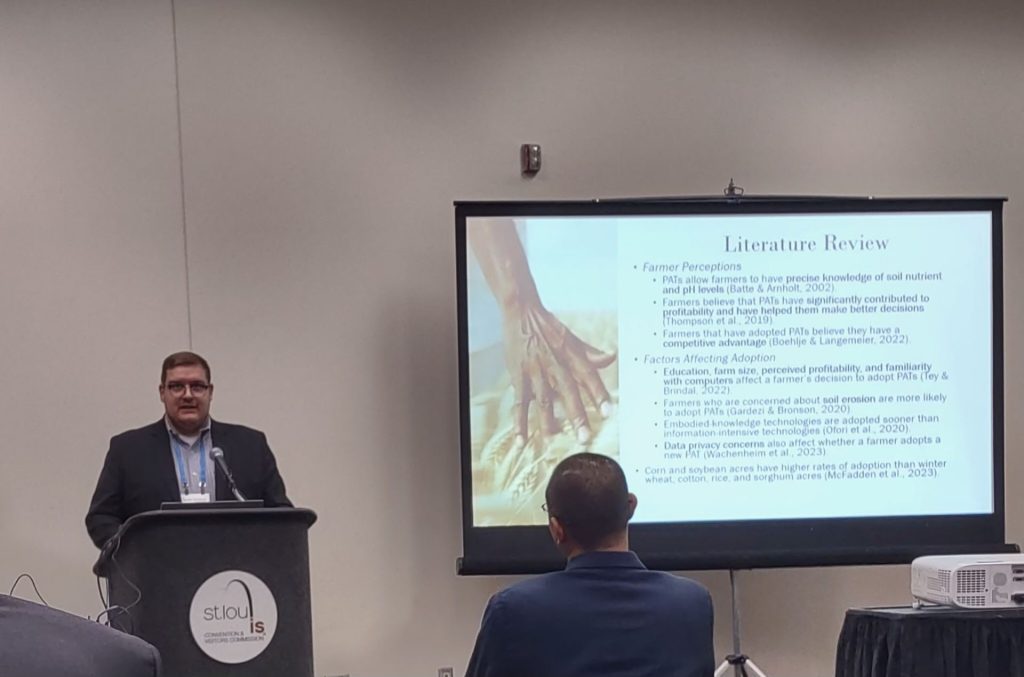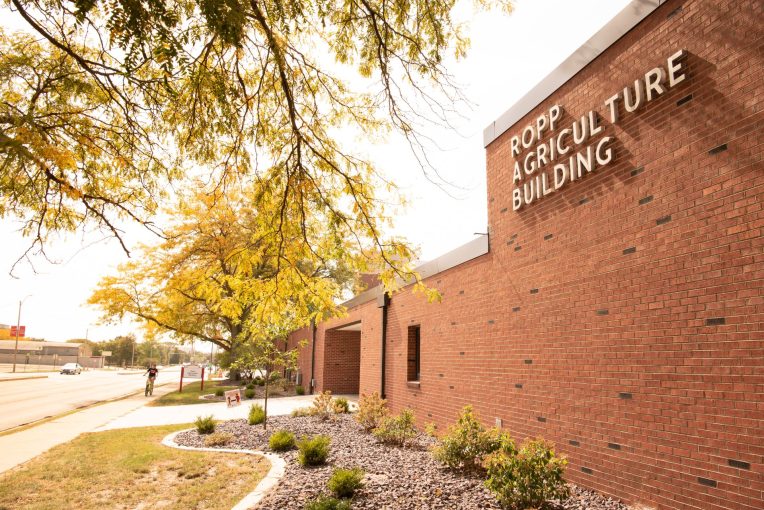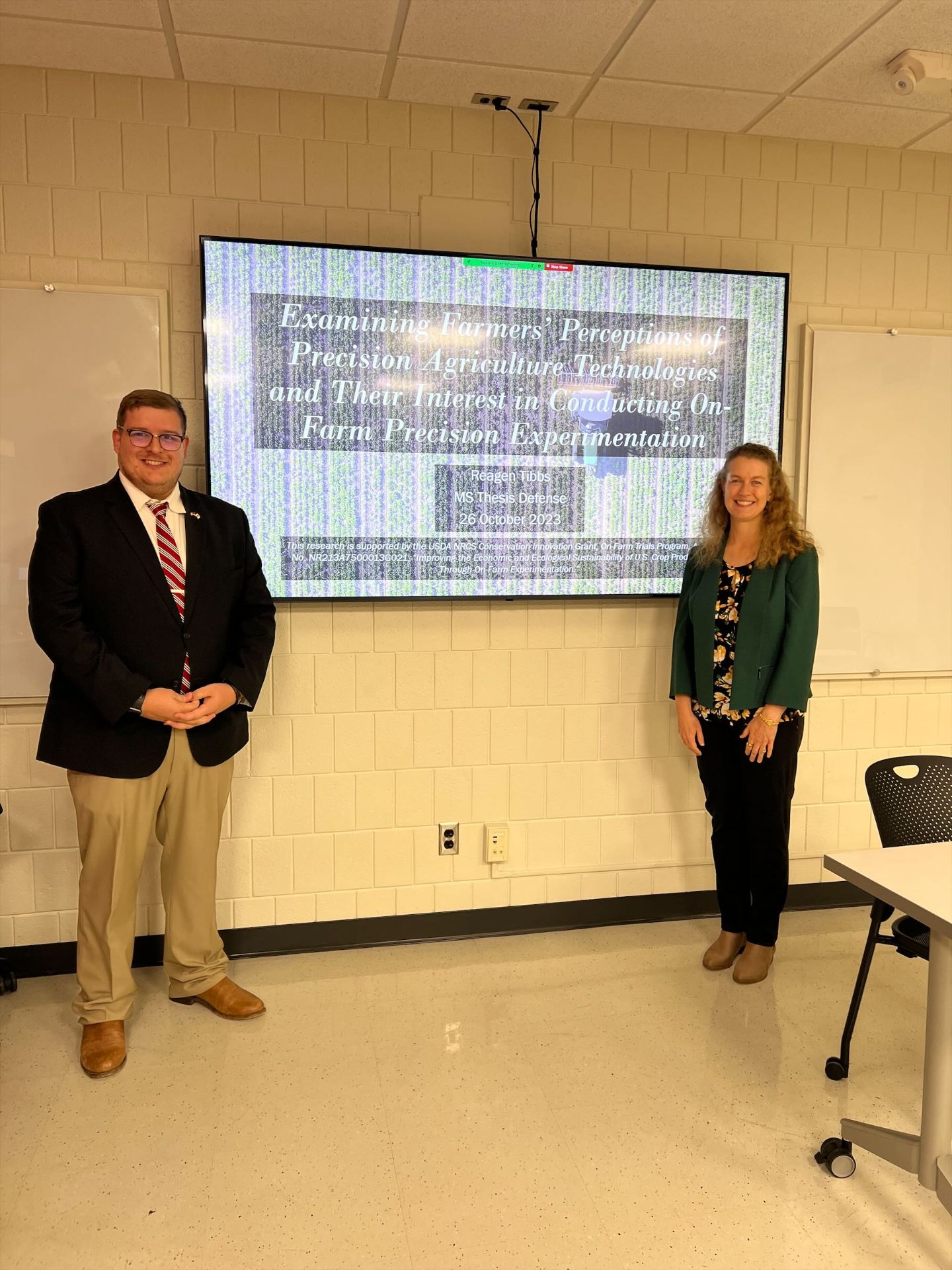When Reagen Tibbs graduates during Illinois State’s winter commencement ceremony on December 16, he walks away with a master’s degree in Agribusiness and a host of lessons that will illuminate his career and personal life.
Tibbs chose the agribusiness program at ISU because of his passion for agriculture and desire to help farmers. In his undergraduate studies, he was a double major in agriculture and political science. The goal was to get into the agricultural policy area and work to help farmers in that way.
While the goal to help farmers has not changed, the means of achieving this goal changed since his graduate studies began.
Through the agribusiness program at ISU, he has learned that there are other ways that farmers can get help.
“Farmers face challenges such as trying to deal with the repercussions of livestock diseases, security issues, and drought as well as slim profit margins due to the cost of inputs such as seeds and fertilizers,” Tibbs said, “There are a lot of pressures as well. For instance, right now, the state of Illinois has put out recommendations to reduce the impact that agriculture has on nutrient run-off, particularly with nitrogen and phosphorus.”
Illinois Environmental Protection Agency notes that these excess nutrients run off into the water and flow into Illinois rivers, lakes, streams, and eventually into the Gulf of Mexico. This can have very adverse effects on those who use the water.
“Farmers are trying to balance these pressures and challenges. One way they can do that is through on-farm precision experiments. They can learn some site-specific management practices to help them better address those challenges and adapt their practices,” Tibbs said.
Although policy-changing would help address some of these challenges, a more direct solution, according to the ’23 graduate, would be to conduct research for the betterment of agricultural practices.
Tibbs’ thesis focused on precision agriculture technologies, particularly, whether farmers want to utilize those technologies to conduct on-farm experiments to come up with solutions to their problems as well as the basis for choosing to conduct these experiments.
During his tenure as a graduate student at ISU, Tibbs represented ISU by presenting his research at multiple international and national conferences. These include academic conferences such as the American Society of Agronomy’s (ASA) international conference, the annual meeting of the Natural Resources Conservation Service (NRCS), as well as at ISU’s research symposiums.

Tibbs’ research project was funded by the United States Department of Agriculture (USDA) under the NRCS grant. Being that this is a multi-university multi-state partnership he hopes that through his affiliation with the University of Illinois, where he will work upon graduation, he can help students who are interested in extending his research.
“Our study was very small—we only had 78 responses to our survey. But I believe that there is a lot more to explore in this area,” Tibbs said.
He also hopes that through his affiliation with the University of Illinois, he will be able to aid farmers by being a resource for some of the challenges they face.
Graduating in a few days feels like a surreal experience for Tibbs, who is also a first-generation student. His family’s support means the world to him.
“I am the first of my family to attend college and graduate and my family could not be prouder of me,” he said.
Coming from a family that lives about 40 miles south of Bloomington Normal, Tibbs notes that ISU is a big part of the area. He got to experience the outpouring of support offered by the Bloomington-Normal Community as a student.
“The opportunity to take my master’s at ISU was an honor. Growing up, everyone I met had some sort of affiliation with Illinois State University. To have experienced first-hand how much the community is invested in the success of the student population was truly memorable,” he said.
It is this support, along with the support he received from the Department of Agriculture’s faculty and staff, that inspires his willingness to advance career-wise.
“I would advise anyone who is interested in taking the agribusiness program at ISU to not be afraid to take chances and opportunities. Now that everything is done and dusted, I would do it again in a heartbeat.”
Reagen Tibbs
Looking back, one of the highlights of his two-year course was participating in the ISU’s research symposium and Three-Minute Thesis program where he advanced as a finalist for the College of Applied Science and Technology. Even so, Tibbs notes that the greatest highlight of his master’s studies is one that is just about to materialize—walking across the stage and receiving his diploma this Saturday.
“Walking across the stage and knowing that all my hard work has paid off is something that I look forward to greatly. Nothing matters more than that at this moment. No matter what happens after, nobody can take away the knowledge and experience that I have received from me,” he affirmed.
The journey has not been an easy one. Being sent home over COVID-19 and being forced to re-adjust to doing everything online was the most challenging part of his studies. However, that too, is a challenge that he had to overcome.
“If you would have told me at the beginning of my studies that I would present in different conferences, have my work published in journals, and overcome many other challenges I would have told you that it wasn’t going to happen,” he said.
For this reason, he cherishes the fact that his graduate studies allowed him to take a chance on himself. Tibbs walks away from ISU with, not only a diploma in hand but tons of knowledge, experiences, and lessons learned.
“One of my greatest takeaways from my graduate studies is that I should move forward with the mindset to learn in all areas,” he said.
“I would advise anyone who is interested in taking the agribusiness program at ISU to not be afraid to take chances and opportunities. There are people out there who think like you and have the same interests as you, you just have to be willing to go out there and find them. Now that everything is done and dusted, I would do it again in a heartbeat,” Tibbs said.
The Department of Agriculture has more information for those interested in the Agribusiness major.


